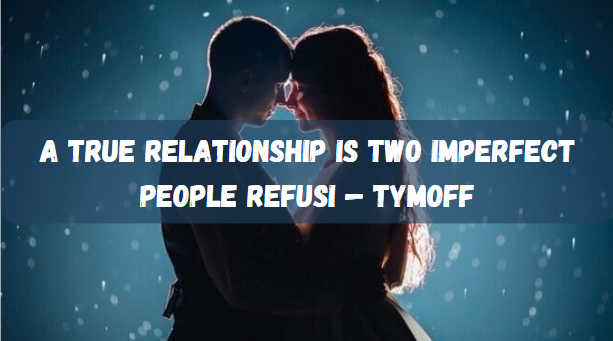Relationships are fundamental to human experience. They shape our lives, provide us with companionship, and help us grow. One powerful quote encapsulates the essence of what makes a relationship truly meaningful: “A true relationship is two imperfect people refusing to give up on each other.” Often attributed to Tymoff, this quote resonates deeply with many individuals.
This article delves into the profound meaning of this quote, exploring its implications for modern relationships, providing insights, analyses, and interpretations that go beyond the surface level.
Understanding the Quote: “A True Relationship Is Two Imperfect People Refusi – Tymoff”
The quote highlights two critical aspects of a relationship: imperfection and commitment. Let’s break it down to understand its full depth.
Imperfection in Relationships
No one is perfect. Each individual comes with a unique set of strengths, weaknesses, quirks, and flaws. In the context of a relationship, imperfections can range from minor habits to significant personal challenges. Acknowledging imperfection is the first step toward understanding and accepting a partner fully.
Commitment to Refusing to Give Up
The second part of the quote focuses on the determination and commitment required to maintain a relationship. It emphasizes the importance of perseverance and the refusal to give up on each other despite the challenges that may arise. This commitment is the bedrock of a true relationship.
The Modern Context of Relationships
In today’s fast-paced, digital age, relationships face unique challenges. Social media, changing societal norms, and the pressures of modern life can all impact how relationships are formed and maintained.
The Impact of Social Media
Social media has transformed how we communicate and connect with others. While it has made it easier to stay in touch, it has also introduced new challenges, such as unrealistic portrayals of relationships and increased opportunities for misunderstandings.
Changing Societal Norms
Societal norms around relationships have evolved significantly. Traditional views on relationships have given way to more diverse and inclusive perspectives. However, this has also led to new dynamics and challenges that couples must navigate.
The Pressures of Modern Life
The demands of modern life, including work, family, and personal ambitions, can strain relationships. Finding a balance between these pressures and maintaining a healthy relationship requires effort and commitment.
The Importance of Communication
Effective communication is the cornerstone of any successful relationship. It allows partners to express their needs, resolve conflicts, and build a deeper understanding of each other.
Expressing Needs and Expectations
Clear communication of needs and expectations helps prevent misunderstandings and ensures that both partners feel heard and valued.
Resolving Conflicts
Conflicts are inevitable in any relationship. How couples handle these conflicts can make or break the relationship. Effective communication allows for healthy conflict resolution, fostering growth and understanding.
Building Understanding
Open and honest communication helps build a deeper understanding between partners. It allows them to connect on a more profound level, fostering intimacy and trust.
The Role of Trust and Vulnerability
Trust and vulnerability are crucial elements of a true relationship. They create a safe space where both partners can be their authentic selves without fear of judgment.
Building Trust
Trust is built over time through consistent actions and behaviors. It requires honesty, reliability, and integrity.
Embracing Vulnerability
Vulnerability involves opening up and sharing one’s true self, including fears, insecurities, and desires. Embracing vulnerability strengthens the bond between partners, as it fosters empathy and connection.
Navigating Challenges Together
Every relationship faces challenges. How couples navigate these challenges can determine the strength and longevity of their relationship.
Facing Adversity
Adversity can come in many forms, such as financial difficulties, health issues, or external pressures. Facing these challenges together strengthens the relationship and demonstrates the partners’ commitment to each other.
Personal Growth and Change
Individuals grow and change over time. Navigating personal growth within the context of a relationship requires understanding, support, and flexibility.
Maintaining Balance
Balancing personal needs, relationship demands, and external pressures is essential for a healthy relationship. It requires ongoing effort and adjustment.
Strategies for Strengthening Relationships
There are several strategies couples can employ to strengthen their relationship and embody the essence of “a true relationship is two imperfect people refusing to give up on each other.”
Prioritizing Quality Time
Spending quality time together helps maintain the connection and intimacy in a relationship. It allows partners to create shared experiences and memories.
Practicing Empathy
Empathy involves understanding and sharing the feelings of another person. Practicing empathy helps partners connect on a deeper level and fosters a supportive relationship.
Seeking Professional Help
Sometimes, relationships may require professional help, such as counseling or therapy. Seeking help when needed demonstrates a commitment to the relationship and a willingness to work through challenges.
Real-Life Examples of True Relationships
Real-life examples can provide valuable insights into what makes a relationship successful and enduring.
Long-Term Marriages
Long-term marriages often exemplify the essence of a true relationship. These couples have navigated various challenges and changes over the years, demonstrating commitment and perseverance.
Overcoming Adversity Together
Couples who have faced significant adversity, such as illness or loss, and emerged stronger exemplify the power of commitment and resilience in a relationship.
Everyday Acts of Love
Sometimes, the simplest acts of love and kindness can have the most significant impact. Everyday gestures, such as listening, supporting, and showing appreciation, contribute to a strong and healthy relationship.
The Role of Self-Love in Relationships
Self-love and self-care are essential components of a healthy relationship. They allow individuals to show up as their best selves and contribute positively to the relationship.
Practicing Self-Care
Self-care involves taking time to nurture one’s physical, emotional, and mental well-being. It helps individuals maintain balance and resilience.
Setting Boundaries
Healthy boundaries are crucial for maintaining a balanced relationship. They ensure that both partners have space to grow and thrive individually.
Fostering Independence
Independence within a relationship allows individuals to pursue their interests and goals while maintaining a strong connection with their partner.
The Impact of External Influences on Relationships
External influences, such as family, friends, and societal expectations, can impact relationships. Navigating these influences requires communication, understanding, and sometimes compromise.
Managing Family Dynamics
Family dynamics can play a significant role in a relationship. Establishing boundaries and maintaining open communication can help navigate these dynamics.
Balancing Friendships
Friendships are important, but they should not overshadow the primary relationship. Balancing time and attention between friends and partners is essential.
Addressing Societal Expectations
Societal expectations around relationships can create pressure and stress. Couples should focus on what works best for them rather than conforming to external expectations.
Building a Lasting Legacy of Love
Building a lasting legacy of love involves creating a relationship that endures and inspires future generations.
Creating Shared Traditions
Shared traditions and rituals can strengthen the bond between partners and create lasting memories.
Modeling Healthy Relationships
Couples who model healthy relationships provide a positive example for others, especially children and young people.
Leaving a Positive Impact
A true relationship leaves a positive impact on the individuals involved and those around them. It contributes to a supportive and loving community.
FAQs About “A True Relationship Is Two Imperfect People Refusi – Tymoff”
What does the quote “a true relationship is two imperfect people refusing to give up on each other” mean?
The quote emphasizes the importance of commitment and perseverance in a relationship. It highlights that true relationships involve accepting each other’s imperfections and refusing to give up despite challenges.
Who is Tymoff?
Tymoff is often attributed as the source of the quote. However, detailed information about Tymoff is not widely available. The quote has gained popularity due to its profound and relatable message.
How can couples maintain a true relationship?
Couples can maintain a true relationship by prioritizing effective communication, building trust, embracing vulnerability, and navigating challenges together. Practicing empathy, spending quality time together, and seeking professional help when needed are also essential strategies.
Why is accepting imperfections important in a relationship?
Accepting imperfections is important because it allows partners to be their authentic selves without fear of judgment. It fosters a supportive and understanding relationship, where both individuals feel valued and loved for who they are.
How does self-love contribute to a healthy relationship?
Self-love and self-care ensure that individuals show up as their best selves in the relationship. It allows them to maintain balance, resilience, and independence, contributing positively to the relationship.
Conclusion
“A true relationship is two imperfect people refusing to give up on each other” is a powerful quote that encapsulates the essence of authentic relationships. In a world where perfection is often idolized, this quote reminds us that true relationships are built on acceptance, commitment, and perseverance. By embracing imperfection, communicating effectively, and navigating challenges together, couples can build strong, lasting relationships that stand the test of time.
Understanding and implementing the principles behind this quote can lead to deeper, more fulfilling connections. As individuals and couples, striving to embody these principles can create a lasting legacy of love, trust, and support.



